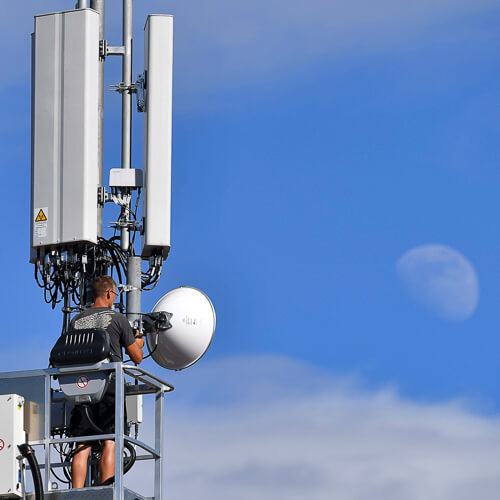
COMSovereign got its start in 2017 when Dan Hodges purchased wireless backhaul provider DragonWave out of bankruptcy. Over the intervening years, Hodges and his business partner John Howell expanded their appetite for telecom equipment vendors to include acquisitions of Drone Aviation Holding (drones for airborne LTE), Fastback Networks (wireless backhaul), Lextrum (full duplex wireless technologies), InduraPower (intelligent batteries and backup power) and Saguna Network (edge computing), among other companies.
By 2020, Hodges' vision for COMSovereign was clear. He told Light Reading at the time that he wanted COMSovereign to be America's Huawei. He said he wanted to use US government funding to position COMSovereign as a US-based alternative to foreign 5G equipment suppliers.
COMSovereign would be a "nightmare scenario" for vendors like Nokia and Ericsson, he said.
But today, it's clear that COMSovereign has fallen on hard times.
Figure 1:  (Source: dpa picture alliance / Alamy Stock Photo)
(Source: dpa picture alliance / Alamy Stock Photo)
In an April presentation to investors, COMSovereign boasted that it was "the US-based end-to-end 4G LTE & 5G+ telecom solution provider." It touted more than 700 network operator customers around the globe. Indeed, in January, COMSovereign had recorded $15.8 million in revenues, mainly thanks to ongoing sales of its DragonWave backhaul radios.
But some troubling signs were emerging. The company's CFO left in April, citing "personal family commitments" at roughly the same time the company missed a Nasdaq reporting deadline.
According to COMSovereign's recent SEC filings, that had all happened around the same time the company discovered it couldn't pay for the massive new manufacturing center it planned to use to put a "made in USA" stamp on all its products.
"On February 1, 2022, the company entered into a 10-year lease for 140,405 square feet of commercial space in Tucson, Arizona, and defaulted on this lease on or about March 1, 2022," COMSovereign told the SEC.
In its filings, the company has hinted that it struggled to obtain the electronics components necessary to build its products. COMSovereign "has been forced to source chips from 2nd and 3rd tier chip vendors," the company wrote, noting that one switch it had bought for $0.70 prior to the pandemic now cost up to $80.
That tracks with similar commentary from a variety of other telecom equipment suppliers, from Cisco to Casa Systems.
A turn for the worse
COMSovereign's troubles continued throughout the summer.
"Our principal executive offices were in Dallas, Texas comprising an aggregate of approximately 15,289 square feet leased by COMSovereign," the company told the SEC. "These premises were vacated and the lease was abandoned by COMSovereign in June of 2022. As a result of the lease abandonment, COMSovereign may face legal claims or proceedings for damages regarding that lease, in an unknown amount."
By August, the company's situation had become dire.
"On August 31, 2022, the Board of Directors of COMSovereign Holding Corp. accepted the resignation of co-founder, Chairman and Chief Executive Officer Daniel L. Hodges, effective September 1, 2022. The Board also concurrently accepted the resignation of co-founder, President and Board member John Howell, effective on September 1, 2022," the company warned.
On September 7, the company announced its new interim CEO, David Knight, previously the CEO of Dispersive Holdings, a cybersecurity company based in Atlanta. The company's board said it was reviewing permanent CEO candidates.
But Knight appears to be working to keep COMSovereign afloat. At the end of September, the company announced a 75% reduction in its headcount. And that headcount wasn't huge to begin with, considering COMSovereign counted 144 full-time employees at the end of 2021 and just 44 employees by June 30, 2022.
Today the company faces a Nasdaq delisting, and Knight has embarked on a sale of the company's 130 patents.
'A business transition'
"COMSovereign is undergoing a business transition which was started earlier this year," a COMSovereign spokesperson wrote in response to questions from Light Reading this week.
"Part of this effort is designed to address issues related to hardware availability, but more importantly, the role of the company's technology in supporting its vision for wireless connectivity in both public and private networks," the spokesperson added. "From a business perspective, this includes a focusing of operations and staffing as well as the intent to increasingly leverage its existing contract manufacturing partners for production of its Fastback and DragonWave products which are in demand from new and existing customers."
According to the spokesperson, "The COMSovereign team continues to work with customers and partners to navigate not only the changing hardware landscape, but their needs for reliable wireless connectivity. We intend to discuss our plans more fully in the coming few weeks."
Related posts:
— Mike Dano, Editorial Director, 5G & Mobile Strategies, Light Reading | @mikeddano
About the Author(s)
You May Also Like




_International_Software_Products.jpeg?width=300&auto=webp&quality=80&disable=upscale)







